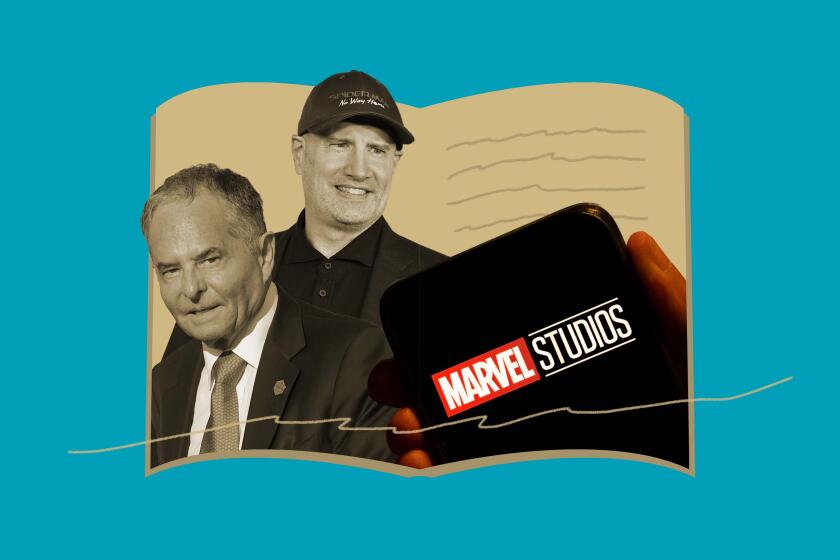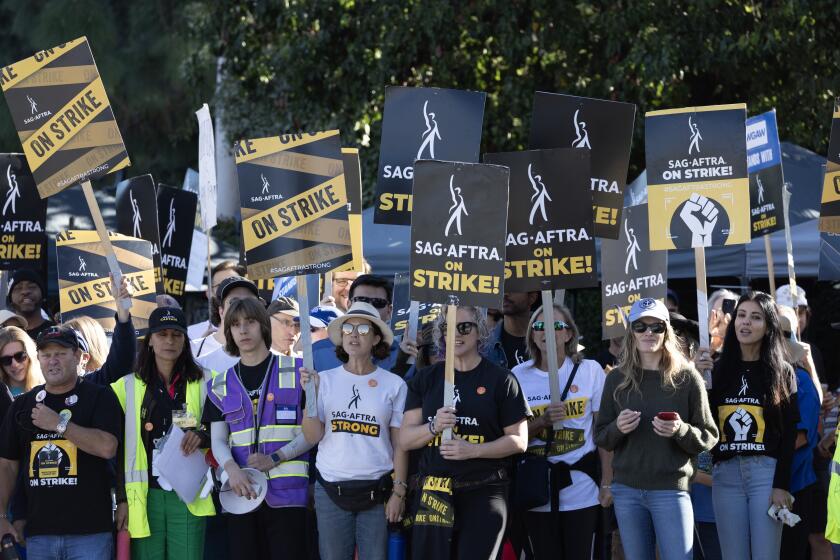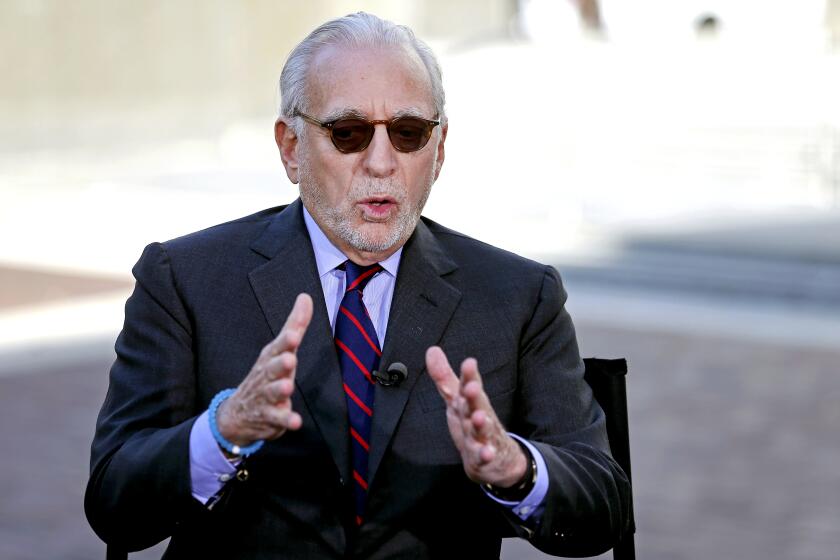Disney CEO Bob Iger touts streaming progress after a year of ‘fixing’

Nearly a year after Bob Iger made his dramatic return to lead Walt Disney Co., the chief executive says the world’s best-known entertainment company is ready to build its business again after a long period of “fixing” what had gone wrong in his absence.
On Wednesday, the company reported significant progress toward making its popular but money-losing streaming services profitable, as it continues the awkward transition from linear television to direct-to-consumer apps.
The company’s streaming businesses posted a combined operating loss of $387 million during the fourth fiscal quarter, an improvement over the $1.47 billion loss during the same period a year prior, partly due to price hikes at Disney+ and Hulu. Disney expects its combined direct-to-consumer business, which includes Disney+, Hulu and ESPN+, to be become profitable in its fiscal fourth quarter of 2024.
Inside the business of entertainment
The Wide Shot brings you news, analysis and insights on everything from streaming wars to production — and what it all means for the future.
You may occasionally receive promotional content from the Los Angeles Times.
Disney+ added 7 million subscribers during the fourth quarter, mostly from international countries — not counting its declining Hotstar streaming business in India. Core Disney+ subscribers now tally 112.6 million, thanks to recent releases such as Pixar’s “Elemental” hitting the service. The Disney+ Hotstar business lost 2.8 million subscribers, totaling 37.6 million.
Overall, Disney reported revenue of $21.2 billion during the quarter that ended Sept. 30 for a year-over-year increase of 5%, falling short of analyst projections of $21.4 billion. Disney’s earnings of 82 cents a share, excluding certain items, beat the expectations of Wall Street analysts, who on average had predicted 71 cents, according to FactSet. Full year earnings increased 7% to $3.76 a share on revenue of $88.9 billion, also up 7%.
“Our results this quarter reflect the significant progress we’ve made over the past year,” Iger said in a statement. “While we still have work to do, these efforts have allowed us to move beyond this period of fixing and begin building our businesses again.”
Joanna Robinson’s new book, “MCU: The Reign of Marvel Studios,” chronicles the rise and stumbles of Hollywood’s most formidable franchise. Disney CEO Bob Iger has indicated he wants to pump the brakes on the Marvel universe.
Disney is looking to further bolster its streaming strategy by taking full control of Hulu, of which it now owns 67%. The company recently said it “expects” to pay $8.6 billion for Comcast Corp.’s 33% stake in the streamer, based on a $27.5-billion floor valuation the firms agreed upon four years ago. Disney may end up paying more after an appraisal process.
Disney is set to launch a “one-app experience” combining Disney+ and Hulu content soon. The company is also expected to crack down on password sharing, but that won’t have a meaningful impact until 2025, Iger told analysts on a conference call.
In his second act as CEO of the Burbank entertainment giant, Iger has faced numerous headwinds following the brief tenure of his handpicked successor, Bob Chapek.
Streaming was losing billions of dollars a year, and traditional TV networks, while still generating cash, were in free fall thanks to cord-cutting. That’s without even mentioning a bruising pair of Hollywood strikes that have kept film and TV production at a standstill for the bulk of the year. All the while, Disney’s stock has taken a beating, falling more than 15% during the last six months.
Last week, the studios were optimistic and SAG-AFTRA was ‘cautiously optimistic’ that the actors’ strike could be resolved soon. Why hasn’t it ended?
Iger’s massive cost-cutting plan, which led to the elimination of 8,000 jobs, is now expected to save the company $7.5 billion, which is $2 billion more than his original target. He’s floated the notion of spinning off traditional TV networks such as ABC and taking on a minority partner for ESPN. Free cash flow surged to $4.9 billion during the full fiscal year, compared with $1.06 billion in 2022.
And yet Iger continues to face pressure from a well-known activist investor, who is restarting a proxy fight against the company.
Billionaire Nelson Peltz and his hedge fund Trian Partners are seeking multiple Disney board seats, and are reportedly supported in their effort by Isaac “Ike” Perlmutter, the former Marvel Entertainment CEO who was ousted in March and is a major Disney shareholder. Peltz dropped a previous proxy battle after Iger announced his cost-cutting plans.
The hedge fund manager, of Trian Partners, abandoned a previous effort to join the Disney board after CEO Bob Iger promised a vast cost-cutting plan for the company.
Wednesday marked the first time Disney broke out earnings for ESPN, specifically, a unit that some analysts have suggested could be spun off as the company evaluates its business for the streaming future.
ESPN’s fourth quarter revenue was $3.8 billion, up 1% from a year ago, while operating income jumped 15% to $953 million due to lower costs (which the company attributed to certain college football contracts expiring) and an increase in revenue from ESPN+.
Disney said the results demonstrate “the value of sports and the power of the ESPN brand.” Iger, in his statement, cited “building ESPN into the preeminent digital sports platform” as one of the company’s key opportunities for growth. ESPN is expected at some point to become a standalone direct-to-consumer service. Iger told analysts that the company was “moving quickly down this path.”
Disney will soon launch ESPN Bet, a sports gambling platform, through a deal with Penn Entertainment.
Revenue for entertainment TV networks other than ESPN — which include ABC, Freeform and Disney Channel — fell 9% to $2.63 billion, while operating income was virtually flat at $805 million. The company recently weathered a brutal carriage dispute with cable distributor Charter Communications that resulted in Disney agreeing to drop networks including FX and Disney Junior from its package for Spectrum pay-TV customers.
ESPN, ABC stations, FX and other Disney-owned channels are part of a high-stakes blackout affecting 14.8 million Charter Spectrum customer homes.
The parks, experiences and consumer products division boosted sales 13% to $8.16 billion, with operating income jumping 31% to $1.76 billion during the quarter thanks to growth from Disney’s cruise line, and increased attendance and guest spending at the Disneyland Resort in Anaheim.
Sales from Disney’s film and TV studios business declined 3% to $1.86 billion, with an operating loss of $149 million compared to a loss of $8 million during the same period of time last year. The results were partly due to the underperformance of Disney’s live-action “Haunted Mansion” movie, which flopped at the box office.
Iger has acknowledged of late that Disney’s content hasn’t been as strong as he would like, as the company’s creative arms, including Marvel Studios, have been spread thin by creating big-budget movies for theaters while also making multiple shows for streaming. Iger said the company will pull back on the amount of programming it makes.
“We lost some focus,” Iger said on the earnings call.
Disney expects content spending to total $25 billion in fiscal 2024, a reduction of $2 billion from 2023, part of a broader industry contraction that is expected in the wake of historic strikes by writers and actors.
Disney stock closed at $84.50 a share Wednesday, virtually unchanged. The shares popped up about 3% in after-hours trading.
More to Read
Inside the business of entertainment
The Wide Shot brings you news, analysis and insights on everything from streaming wars to production — and what it all means for the future.
You may occasionally receive promotional content from the Los Angeles Times.















